[ad_1]
Table of Contents
COVID-19 antibodies may offer at least partial protection
Americans with COVID-19 antibodies displayed 10-fold increased protection against infection 90 days after testing compared with those who had no antibodies, according to a study published today in JAMA Internal Medicine.
The study tracked more than 50% of the commercial antibody and diagnostic tests administered in the United States from Jan 8 to Aug 23, 2020, covering 3,257,478 people. At the index test, 88.3% had a negative antibody test, 11.6% were positive, and 0.1% were excluded because of uncertain results.
The researchers then followed the seropositive and seronegative groups for a median of 54 and 47 days, respectively. During this time, 41,587 (11.0%) of seropositive individuals and 273,735 (9.5%) of seronegative individuals received at least one nucleic acid amplification test (NAAT), most commonly polymerase chain reaction (PCR).
While 11.3% of this seropositive subgroup had a positive NAAT during days 0 to 30, most likely due to continued viral RNA shedding, the prevalence declined to 2.7% from days 31 to 60, 1.1% from days 61 to 90, and 0.3% beyond day 90. Across each period, about 3.0% of the seronegative group had positive NAAT results.
In other words, the ratio of positive NAATs in seropositive versus seronegative people declined from 2.85 (95% confidence interval [CI], 2.73 to 2.97) during the first 30 days to 0.10 (95% CI, 0.05 to 0.19) after day 90. Because some of the positive NAATs after day 60 could be reinfections in the seropositive group, the researchers note, “Protection against reinfection is likely relative rather than complete.”
“The data from this study suggest that people who have a positive result from a commercial antibody test appear to have substantial immunity to SARS-CoV-2, which means they may be at lower risk for future infection,” says lead researcher Lynne Penberthy, MD, MPH, in a National Cancer Institute (NCI) press release.
In an editor’s note, Mitchell Katz, MD, of NYC Health and Hospitals, writes that, despite the findings, “Vaccination against SARS-CoV-2 is recommended regardless of antibody status.”
Feb 24 JAMA Intern Med study
Feb 24 JAMA Intern Med editor’s note
Feb 24 NCI press release
Empathetic calls associated with better mental health during pandemic
An empathy-focused telephone program was associated with reduced loneliness, depression, and anxiety in 120 Meals on Wheels Central Texas clients, according to a study published yesterday in JAMA Psychiatry.
From Jul 6 to Sep 24, 2020, the researchers had 120 people receive daily telephone calls for the first 5 days and then, depending on preference, at least twice a week for a total of 4 weeks. After the first 5 days, 58.3% of the intervention group chose to continue the daily calls, followed by 22.5% choosing twice a week. The 120 people in the control group received no calls.
All study participants had at least one chronic condition, and 63% were at least 65 years old. More than half (56.3%) were living alone. Thirteen people in the intervention group and 1 in the control group were lost to follow-up, so the final data were for 107 and 119, respectively.
Callers received 1 hour of video conference training, handouts, and videotaped instructions on conducting conversations led by the recipient’s interests. While these conversations were intended to be less than 10 minutes, some went longer.
When comparing the intervention and control groups, the intervention group improved 1.1 points on the UCLA Loneliness Scale (95% confidence interval [CI], 0.5 to 1.7), 0.32 point on the De Jong Giervald Loneliness Scale (95% CI, -0.20 to 0.81, not statistically significant), 1.5 points on the Personal Health Questionnaire for Depression (95% CI, 0.22 to 2.7), and 1.8 points on the Generalized Anxiety Disorder scale (95% CI, 0.44 to 3.2). Overall, the intervention group’s self-assessed mental health score via the Short Form Questionnaire Survey increased 2.6 points relative to the control group (95% CI, 0.81 to 4.4).
“In this study, loneliness, depression, and anxiety were rapidly reduced through layperson-delivered calls that focused on empathetic listening, suggesting a scalable approach to persistent mental health challenges of older adults,” the researchers write. “Future work should address whether improvements can be sustained, or enhanced, with a longer implementation period.”
Feb 23 JAMA Psychiatry study
[ad_2]
Source link












